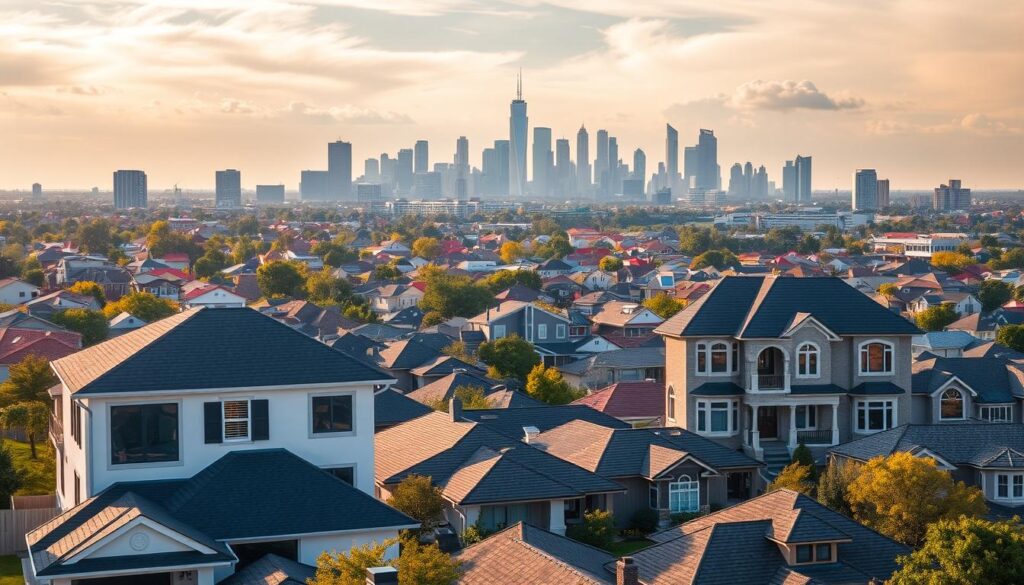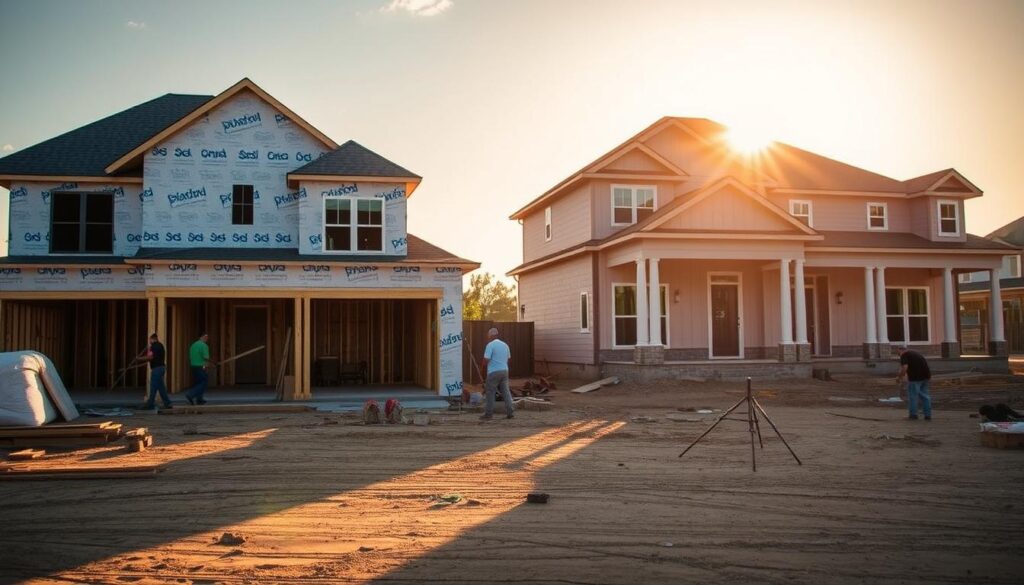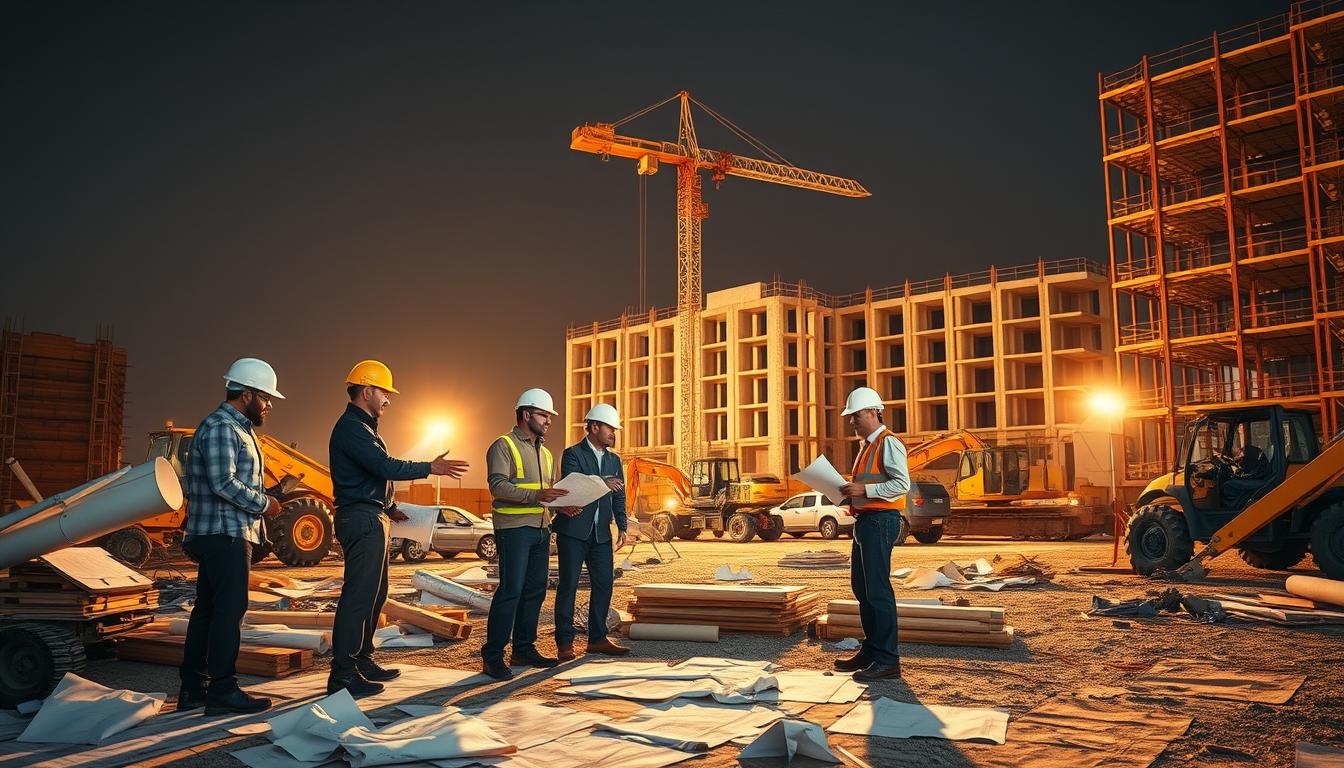Choosing between pre-designed and fully personalized residences shapes how buyers experience ownership. While both paths lead to a new home, the journey varies significantly in design freedom, timelines, and financial planning.
Turnkey solutions from production builders prioritize speed and affordability, using pre-approved floor plans and standardized materials. These homes often feature quicker construction timelines, making them ideal for those prioritizing efficiency. However, customization remains limited to preset options for finishes or layouts.
Tailored designs through custom home builders allow buyers to shape every detail, from room configurations to specialty materials. This approach suits those valuing unique spaces aligned with specific lifestyle needs. While offering unmatched flexibility, these projects typically involve longer timelines and higher upfront costs.
Local expertise matters in navigating these options. For expert guidance, contact New Homes Houston Texas at (954) 821-4492. Their team helps balance priorities like budget, timeline, and design preferences for Houston-area buyers.
Key Takeaways
- Production homes prioritize speed and cost efficiency with pre-set designs
- Custom builds offer full personalization but require longer timelines
- Material choices differ significantly between standardized and bespoke projects
- Local builders impact project success through regional construction knowledge
- Budget planning varies based on fixed-price vs variable-cost models
Introduction to Houston Home Options
Houston’s housing market provides diverse paths for creating living spaces that match individual priorities. Whether prioritizing efficiency or artistic expression, local builders deliver solutions through two primary avenues: standardized developments and fully personalized projects.

Streamlined Living Through Pre-Designed Solutions
Pre-planned residences attract those seeking simplicity. Builders use proven layouts and bulk material purchases to reduce costs and construction durations. Most projects complete within 6-9 months, with fixed pricing that simplifies financial planning.
Popular communities like Woodforest or Bridgeland showcase how preset floor plans accommodate families needing quick occupancy. As one industry expert notes: “Standardized builds remove guesswork while maintaining quality through repeatable processes.”
Crafting Unique Spaces in the Bayou City
Tailored residences empower owners to shape every architectural detail. From vaulted ceilings to specialty flooring, these projects reflect personal tastes and functional requirements. Though timelines often extend beyond 12 months, the result becomes a one-of-a-kind asset.
Local zoning regulations and soil conditions make Houston-specific expertise crucial. Builders like New Homes Houston Texas (954-821-4492) help navigate these complexities while balancing creative aspirations with practical considerations.
| Feature | Pre-Planned Residences | Tailored Residences |
|---|---|---|
| Design Flexibility | Limited to preset options | Full creative control |
| Average Timeline | 6-9 months | 12-18 months |
| Cost Predictability | Fixed pricing | Variable budgets |
| Material Selection | Standard packages | Custom specifications |
Both approaches serve distinct lifestyles effectively. Immediate-need buyers often prefer turnkey solutions, while vision-driven clients opt for bespoke creations. Subsequent sections will explore how these differences impact budgets, timelines, and long-term satisfaction.
Design and Customization: Tailored versus Turnkey
Design choices define how residents interact with their living spaces, shaping daily routines and long-term satisfaction. This section explores how different approaches to architectural planning affect functionality and aesthetic appeal.
Personalization and Architectural Flexibility
Tailored residences transform blueprints into lifestyle reflections. Owners collaborate with architects to adjust room dimensions, window placements, and traffic flow patterns. For example, some Houston-area builders specialize in creating chef-inspired kitchens with commercial-grade appliances or spa-like primary suites.
Material selection becomes an expressive tool in these projects. Clients might choose reclaimed wood accents, handmade tiles, or energy-efficient smart glass. One local designer notes: “True customization lets every doorway height or light switch location align with how families actually live.”
Standardized Designs in Production Homes
Pre-engineered floor plans prioritize practicality through proven layouts. Builders optimize square footage usage with bedroom placements that maximize privacy and common areas designed for modern entertainment needs. These designs undergo rigorous testing to ensure structural integrity across various lot sizes.
Buyers select from curated upgrade packages that balance style and affordability. Options often include:
- Three cabinet finish tiers (basic to premium)
- Pre-wired smart home technology bundles
- Landscaping add-ons matching community aesthetics
While less adaptable than bespoke projects, these streamlined choices reduce decision fatigue. Completed homes in communities like Energy Corridor demonstrate how standardized layouts can still feel inviting through strategic finish selections.
Comparing Costs and Construction Timelines
Financial decisions and project durations often determine which building approach suits buyers best. Production and custom residences present distinct cost structures and scheduling realities that impact ownership experiences.
Budget Considerations and Economies of Scale
Standardized developments leverage bulk material purchases and repeatable designs to lower expenses. A typical 2,500 sq.ft. production home in Houston communities like Sienna averages $180-$220 per square foot. This pricing includes pre-selected materials and streamlined labor costs.
Bespoke projects often exceed $300 per square foot due to architectural fees, specialty materials, and unique engineering requirements. As one local builder explains: “Custom clients invest in one-of-a-kind features, while production buyers benefit from shared infrastructure costs across entire neighborhoods.”
Duration of the Building Process and Move-In Readiness
Pre-engineered homes typically complete in 6-9 months with fixed schedules. Builders coordinate multiple trades simultaneously across identical floor plans, minimizing delays. Many Houston developments offer move-in-ready inventory for immediate occupancy.
Tailored residences require 12-18 months due to design iterations, permit approvals, and material sourcing. Unexpected challenges like soil adjustments in coastal areas can extend timelines further. Buyers trade speed for personalization.
| Factor | Standardized Builds | Bespoke Builds |
|---|---|---|
| Average Cost/Sq.Ft. | $180-$220 | $300+ |
| Typical Timeline | 6-9 months | 12-18 months |
| Common Delays | Weather | Design Revisions |
Smart budgeting requires understanding these trade-offs. Production options suit time-sensitive buyers, while custom builds reward those prioritizing unique features over speed.
Production vs Custom Homes in Houston: Key Features & Process
The journey from blueprint to move-in day varies dramatically between standardized and personalized builds. While both approaches create functional living spaces, their roadmaps diverge in planning depth and creative involvement.

Step-by-Step Construction and Planning Differences
Production builders follow a streamlined sequence: select lot, choose pre-approved layout, begin construction. Crews work on multiple identical structures simultaneously, using prefabricated components to accelerate timelines. A Houston-area project manager explains: “Our teams complete foundation work for 10 houses in the time custom builders finish one.”
Custom projects start with land evaluation and architectural consultations. Clients revise designs through multiple iterations before breaking ground. This collaborative process ensures unique features like cantilevered decks or specialized HVAC systems meet exact specifications.
Material Selection, Finishes, and Custom Options
Standardized builds use predetermined material packages. Buyers select from:
- Three cabinet color options
- Two countertop materials
- Pre-curated lighting fixtures
Tailored residences allow sourcing specialty elements like reclaimed barn wood accents or commercial-grade kitchen appliances. One client transformed their entryway with hand-painted Moroccan tiles unavailable in production communities.
Builders recommend prioritizing structural upgrades early in custom projects. “Invest in quality insulation before picking bathroom fixtures,” advises a local contractor. This strategic approach balances aesthetics with long-term performance.
Conclusion
Finalizing your residential vision depends on aligning priorities with the right construction model. Pre-designed residences deliver cost efficiency through standardized layouts and faster completion, typically within nine months. Bespoke projects empower owners with full creative control, though often requiring extended timelines exceeding a year.
Key distinctions include:
– Architectural flexibility versus preset floor plans
– Variable budgets against fixed pricing structures
– Bulk material sourcing compared to specialty selections
Local expertise proves invaluable when weighing these factors. New Homes Houston Texas guides clients through critical decisions, balancing lifestyle needs with practical constraints. Their team brings regional knowledge to every project, ensuring optimal outcomes whether choosing streamlined builds or personalized creations.
For tailored advice matching your aspirations, contact New Homes Houston Texas at (954) 821-4492. Their professionals transform housing concepts into reality through data-driven insights and proven methodologies.





